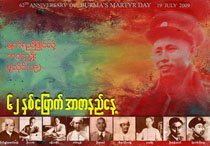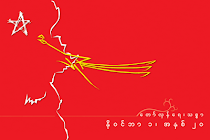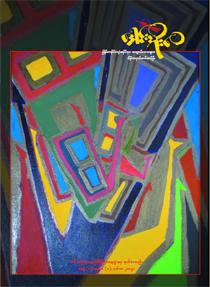การข่มขู่และความสับสนอลหม่านทำให้การควบคุมแรงงานข้ามชาติในประเทศไทยเกิดความด่างพร้อย
โดย Kelly Macnamara (สำนักข่าวเอ เอฟ พี)
มหาชัย (สำนักข่าวเอ เอฟ พี) ปัญหาระหว่างอูกับตำรวจไทยเริ่มขึ้นเมื่อเขาขอร้องให้เจ้าหน้าที่ถอดรองเท้าออกก่อนเดินเข้าห้อง ซึ่งเป็นคำขอตามปกติของผู้คนที่อาศัยอยู่ในทวีปเอเชียแห่งนี้
ปัญหาดังกล่าวทำให้อูต้องจ่ายเงินเป็นจำนวนเกือบเท่ากับเงินเดือนทั้งเดือน
แรงงานข้ามชาติชาวพม่าอายุ ๒๖ ปีผู้ทะนงในศักดิ์ศรีของตนกล่าวว่าเจ้าหน้าที่ตำรวจจากมหาชัยถามว่าเขาอยากจะ “มีปัญหา” หรือไม่
แม้เขาจะแสดงหลักฐานของทางการให้แก่เจ้าหน้าที่ แต่อูอ้างว่าเขายังถูกใส่ความในข้อหาให้กู้เงินนอกระบบและถูกข่มขู่ว่าจะส่งตัวออกนอกประเทศไทยจนกว่าจะเสียค่าปรับจำนวนกว่าสี่พันบาท (ประมาณ ๑๒๘ เหรียญสหรัฐฯ) ซึ่งทียบเท่ากับเงินค่าจ้างจำนวน ๒๐ วัน
ประเทศไทยเริ่มปฏิบัติการควบคุมและปราบปรามแรงงานข้ามชาติที่มิได้จดทะเบียนอย่างเข้มงวดมาระยะหนึ่งแล้ว อันเป็นส่วนหนึ่งของความพยายามในการทำให้จำนวนแรงงานแรงงานข้ามชาติที่มีอยู่อย่างมหาศาลในประเทศถูกต้องตามกฎหมาย
อย่างไรก็ตาม กลุ่มสิทธิมนุษยชนต่างๆ กำลังกังวลกันว่าอาจมีหลายชีวิตถูกกวาดต้อนให้ติดร่างแหไปด้วยแม้ว่าพวกเขามีเอกสารจากทางการ ถูกต้องในขณะที่หลายๆ ฝ่ายเกิดความหวาดกลัวว่าเจ้าหน้าที่ตำรวจบางกลุ่มจะเพิ่มมาตรการข่มขู่ให้รุนแรงขึ้น
อานดี้ ฮอลล์ ที่ปรึกษาของมูลนิธิสิทธิมนุษยชนและการพัฒนา กล่าวว่าเจ้าหน้าที่ตำรวจกำลังรีดไถเงินจากแรงงานข้ามชาติที่ไม่มีทางสู้เหล่านี้โดย “ได้รับการยกเว้นโทษจากการกระทำผิดดังกล่าวอย่างสิ้นเชิง”
“ผมเห็นว่าการที่เจ้าหน้าที่สามารถกระทำการนี้ได้อย่างเป็นระบบทั้งประเทศไทยแสดงให้เห็นถึงการรุกล้ำของวัฒนธรรมที่มองพวกแรงงานข้ามชาติเป็นบุคคลชั้นสองและเกือบจะไม่มีความเป็นมนุษย์หลงเหลืออยู่” อานดี้แถลง
เมื่อเร็วๆ นี้ รัฐบาลไทยขอให้เจ้าหน้าที่เพิ่มความพยายามในการระบุตัวแรงงานข้ามชาติผิดกฎหมาย ตามกำหนดในเดือนก.พ. ๒๕๕๓ ซึ่งเป็นช่วงการสมัครเข้ารับการพิสูจน์สัญชาติจากรัฐบาลไทยเพื่อมอบสถานะให้แรงงานแรงงานข้ามชาติ [ถูกกฎหมาย]
นายปณิธาน วัฒนายากรณ์ โฆษกรัฐบาลไทยกล่าวว่า เจ้าหน้าที่ของไทยมีความประสงค์ให้แรงงานข้ามชาติเข้าสู่ระบบดังกล่าว “เพื่อให้ได้รับความคุ้มครอง” และกล่าวว่าทางรัฐบาลตระหนักดีถึงการข่มขู่แรงงานจากตำรวจในบางพื้นที่เป็นอย่างดี
“หากเจ้าหน้าที่ของไทยทำผิดและ มีรายงานมาถึงทางการ รัฐบาลจะดำเนินคดีทันที ... แต่ปัญหาก็คือมี (แรงงานข้ามชาติ) หลายคนไม่ออกมาเรียกร้องกันเอง” นายปณิธานกล่าว
จากสถิติของสถานีตำรวจนครบาลมหาชัยแสดงให้เห็นว่ามีการจับกุมแรงงานข้ามชาติมากถึง ๔๐๐ รายซึ่งสูงกว่าเดือนมีนาคมที่ผ่านมาถึง ๘๐ ราย แต่อานดี้กล่าวว่าจำนวนที่แท้จริงนั้นอาจสูงถึงพันรายเนื่องจากแรงงานข้ามชาติที่ถูกจับกุมบางกลุ่มอาจจ่ายเงินเพื่อให้ได้รับการปล่อยตัวไป
จำนวนของแรงงานแรงงานข้ามชาติชาวพม่า ลาวและกัมพูชาในประเทศไทยอาจสูงถึงสองล้านคน หากมีการรวมจำนวนของแรงงานที่มิได้ลงทะเบียนอย่างเป็นทางการอีกประมาณหนึ่งล้านคนเข้าไว้ด้วย
อานดี้ย้ำว่าแรงงานที่มาจากพม่ามิได้หนีออกนอกประเทศเพราะปัญหาความขัดแย้งภายใน แต่พวกเขาต้องการหลบหนีจากสภาพเศรษฐกิจ “ที่ย่ำแย่” เพื่อหาเงินจากประเทศไทยส่งกลับมายังบ้านเกิดของตน
“บางที สถานการณ์ในประเทศไทยอาจดีกว่าในพม่าด้วยซ้ำ แต่คนเหล่านี้อาจติดอยู่ในนรกสองขุม” อานดี้กล่าว
นายจ้างใน จ. สมุทรปราการคนหนึ่งที่ไม่ประสงค์ออกนามแจ้งว่าเจ้าหน้าที่ได้จับกุมแรงงานแรงงานข้ามชาติไปกว่าสองร้อยคนในวันเดียวโดยปราศจากการตรวจสอบหลักฐาน
แรงงานนี้จะถูกส่งไปที่กรุงเทพฯ ทำให้นายจ้างต้องส่งเอกสารตามไปเพื่อแลกอิสรภาพ
“บางโรงงาน มีแรงงานถึง ๓๐ คนจาก ๔๐ คนที่ถูกจับ ทำให้ไม่สามารถดำเนินธุรกิจได้ เราต้องเสียหายไปเท่าไรหากไม่ได้ทำงานแค่สองสามวัน แต่ตำรวจก็ไม่สนใจ” นายจ้างรายนี้เอ่ยขึ้น
พยู พวินท์ อู แรงงานจากภาคใต้ของพม่าอายุ ๑๙ ปีเล่าเรื่องที่ถูกจับกุมขณะกำลังเดินทางกลับบ้านหลังจากเลิกงานที่โรงงานอาหารทะเลในมหาชัย
เธอเล่าว่าเมื่อพบว่าตนเองถูกขังคุกในกรุงเทพฯ กับผู้หญิงอีก ๕๐ คน จึงตระหนักว่าถูกจับกุมโดยกองกำลังของเจ้าหน้าที่ตรวจคนเข้าเมือง
“เขาให้อาหารสามมื้อ แต่ฉันไม่มีโอกาสได้อาบน้ำหรือแม้แต่เปลี่ยนเสื้อผ้าเป็นเวลาถึงหกวัน” เธอรายงานให้สำนักงานเอ เอฟ พีทราบหลังจากนายจ้างมาประกันตัวออกไป
นายฟิล โรเบิร์ตสัน ผู้ช่วยผู้อำนวยการของฮิวแมน ไรท์ วอชแห่งเอเชียกล่าวว่าการมีกองกำลังเจ้าหน้าที่ตรวจคนเข้าเมืองจากส่วนกลางในพื้นที่ดังกล่าวหมายความว่า “ไม่มีทางเลือกอื่นหลงเหลืออีกแล้ว” เพราะข้อตกลงระหว่างตำรวจในท้องที่ นายจ้างและลูกจ้างจะถูกล้มเลิกไปโดยปริยาย
แต่เขากล่าวว่า ตามปกติ แรงงานข้ามชาติมักตกเป็น “เป้านิ่ง” ของตำรวจซึ่งคอยจับกุมให้มากกว่าที่ได้รับการกำหนดจำนวนมาแล้วปล่อยตัวผู้ที่มีเงินหรือติดสินบนออกไป
พันเอก พงษ์ศักดิ์ ชูนาค ผู้บัญชาการประจำสถานีตำรวจมหาชัยปฏิเสธว่ามีการคอร์รัปชั่นเกิดขึ้นในท้องที่ของตน โดยกล่าวว่า “ไม่เคยมีการร้องเรียนถึงการใช้วิธีข่มขู่ของเจ้าหน้าที่ในท้องที่เลย”
ประเด็นดังกล่าวยังคงเป็นเรื่องต้องห้ามในประเทศที่ธุรกิจต่างๆ ต้องเกรงกลัวเจ้าหน้าที่ตำรวจ
“ความจริงก็เป็นที่รู้ๆ กันอยู่แล้วแต่ดิฉันไม่สามารถพูดอะไรได้มาก เพราะอาจตกอยู่ในอันตรายได้” นายจ้างคนเดิมกล่าวทิ้งท้ายเมื่อถูกถามถึงปัญหาการคอร์รัปชั่น
--------------------
**Extortion and confusion mar Thailand's migrant crackdown**
...by Kelly Macnamara..
MAHACHAI (AFP) -- Oo's troubles with the local Thai police began with a request common across Asia -- he asked them to remove their shoes before entering his room.
It cost him nearly a month's wages.
The proud 26-year-old Myanmar migrant said the officers in Mahachai, an industrial area near Bangkok, asked him if he wanted to "make trouble".
Oo claims he was falsely accused of illegal lending and threatened with deportation -- despite having documents proving his legal status -- until he handed over 4,000 baht (128 dollars), around 20 day's pay.
Thailand has intensified its crackdown on unregistered migrants as part of attempts to legalise its huge population of overseas workers.
But rights groups are concerned that many people are swept up in the process despite having official documents, while there are fears that some police are using the operation to step up extortion.
Andy Hall, consultant to the Human Rights and Development Foundation, said police were extracting money from vulnerable migrants with "complete impunity".
"I think that the fact they're doing this so systematically all across Thailand shows just how much a culture of seeing the migrants as second class and as almost subhuman has now become entrenched," he said.
The government recently told authorities to step up efforts to identify illegal migrants, following a February 2010 deadline to apply for the National Verification scheme aimed at normalising foreign workers' status.
Government spokesman Panitan Wattanayagorn said authorities were keen to persuade migrants to join the system "so they can be protected", but he added the government was aware of police extortion in some areas.
"If officers are committing fraud and are reported we will prosecute those officers... but the problem is many of (the migrants) don't come forward," he said.
Figures from the Mahachai police show a surge to more than 400 arrests in August, up from around 80 in March. But Hall said the real numbers are likely to be in the thousands as arrested migrants with money pay to be released.
The total number of migrants from Myanmar, Laos and Cambodia could exceed two million, when an estimated one million unregistered workers are taken into account.
Hall stresses those from Myanmar, formerly known as Burma, are not fleeing conflict. Rather they have left behind an economy "in ruins" and many send money home from Thailand.
"Maybe the conditions are better than in Burma, but they are caught between two hells," he said.
One Samut Sakhon employer, who refused to be named, said authorities had arrested over 200 people in a single day without checking their papers.
The workers were taken to Bangkok, forcing employers to send documents to the capital to free them.
"In some factories 30 out of 40 workers were arrested, so they can't run their businesses at all. Can you imagine how much we lose for not working for a few days? The police don't seem to care," she said.
Phyu Pwint Oo, a shy 19-year-old from southern Myanmar, described being caught up in a round-up as she returned home from her job in a Mahachai seafood factory.
She said it was only when she found herself in a cell in Bangkok with 50 other women that she realised she had been arrested by immigration forces.
"They gave me three meals a day, but I didn't have a chance to take a shower and could not change my clothes for six days," she told AFP a day after her employer secured her release.
Phil Robertson, deputy director of Human Rights Watch in Asia, said the arrival of central immigration forces in an area meant "all bets are off", with any deals between local police, employers and workers effectively cancelled.
But he said ordinarily the migrants were an "easy target" for local police, who arrest more than their quota and then release those with money for bribes.
Mahachai police commander Colonel Pongak Chunak denied that there was any corruption in his force. "There have been no complaints about extortion in the area under my command," he said.
The subject remains taboo in a country where even businesses fear the police.
"The truth is there but I cannot say anything, it could be dangerous for my life," the Samut Sakhon employer said when questioned on corruption.
-- ©Copyright AFP 2010-09-07
Published with written approval from AFP.
**migrantjustice@hrdfoundation**.
คำแปลอย่างไม่เป็นทางการโดยมูลนิธิเพื่อสิทธิมนุษยชนและการพัฒนา (มสพ.)
การข่มขู่และความสับสนอลหม่านทำให้การควบคุมแรงงานข้ามชาติในประเทศไทยเกิดความด่างพร้อย
โดย Kelly Macnamara (สำนักข่าวเอ เอฟ พี)
มหาชัย (สำนักข่าวเอ เอฟ พี) ปัญหาระหว่างอูกับตำรวจไทยเริ่มขึ้นเมื่อเขาขอร้องให้เจ้าหน้าที่ถอดรองเท้าออกก่อนเดินเข้าห้อง ซึ่งเป็นคำขอตามปกติของผู้คนที่อาศัยอยู่ในทวีปเอเชียแห่งนี้
ปัญหาดังกล่าวทำให้อูต้องจ่ายเงินเป็นจำนวนเกือบเท่ากับเงินเดือนทั้งเดือน
แรงงานข้ามชาติชาวพม่าอายุ ๒๖ ปีผู้ทะนงในศักดิ์ศรีของตนกล่าวว่าเจ้าหน้าที่ตำรวจจากมหาชัยถามว่าเขาอยากจะ “มีปัญหา” หรือไม่
แม้เขาจะแสดงหลักฐานของทางการให้แก่เจ้าหน้าที่ แต่อูอ้างว่าเขายังถูกใส่ความในข้อหาให้กู้เงินนอกระบบและถูกข่มขู่ว่าจะส่งตัวออกนอกประเทศไทยจนกว่าจะเสียค่าปรับจำนวนกว่าสี่พันบาท (ประมาณ ๑๒๘ เหรียญสหรัฐฯ) ซึ่งทียบเท่ากับเงินค่าจ้างจำนวน ๒๐ วัน
ประเทศไทยเริ่มปฏิบัติการควบคุมและปราบปรามแรงงานข้ามชาติที่มิได้จดทะเบียนอย่างเข้มงวดมาระยะหนึ่งแล้ว อันเป็นส่วนหนึ่งของความพยายามในการทำให้จำนวนแรงงานแรงงานข้ามชาติที่มีอยู่อย่างมหาศาลในประเทศถูกต้องตามกฎหมาย
อย่างไรก็ตาม กลุ่มสิทธิมนุษยชนต่างๆ กำลังกังวลกันว่าอาจมีหลายชีวิตถูกกวาดต้อนให้ติดร่างแหไปด้วยแม้ว่าพวกเขามีเอกสารจากทางการ ถูกต้องในขณะที่หลายๆ ฝ่ายเกิดความหวาดกลัวว่าเจ้าหน้าที่ตำรวจบางกลุ่มจะเพิ่มมาตรการข่มขู่ให้รุนแรงขึ้น
อานดี้ ฮอลล์ ที่ปรึกษาของมูลนิธิสิทธิมนุษยชนและการพัฒนา กล่าวว่าเจ้าหน้าที่ตำรวจกำลังรีดไถเงินจากแรงงานข้ามชาติที่ไม่มีทางสู้เหล่านี้โดย “ได้รับการยกเว้นโทษจากการกระทำผิดดังกล่าวอย่างสิ้นเชิง”
“ผมเห็นว่าการที่เจ้าหน้าที่สามารถกระทำการนี้ได้อย่างเป็นระบบทั้งประเทศไทยแสดงให้เห็นถึงการรุกล้ำของวัฒนธรรมที่มองพวกแรงงานข้ามชาติเป็นบุคคลชั้นสองและเกือบจะไม่มีความเป็นมนุษย์หลงเหลืออยู่” อานดี้แถลง
เมื่อเร็วๆ นี้ รัฐบาลไทยขอให้เจ้าหน้าที่เพิ่มความพยายามในการระบุตัวแรงงานข้ามชาติผิดกฎหมาย ตามกำหนดในเดือนก.พ. ๒๕๕๓ ซึ่งเป็นช่วงการสมัครเข้ารับการพิสูจน์สัญชาติจากรัฐบาลไทยเพื่อมอบสถานะให้แรงงานแรงงานข้ามชาติ [ถูกกฎหมาย]
นายปณิธาน วัฒนายากรณ์ โฆษกรัฐบาลไทยกล่าวว่า เจ้าหน้าที่ของไทยมีความประสงค์ให้แรงงานข้ามชาติเข้าสู่ระบบดังกล่าว “เพื่อให้ได้รับความคุ้มครอง” และกล่าวว่าทางรัฐบาลตระหนักดีถึงการข่มขู่แรงงานจากตำรวจในบางพื้นที่เป็นอย่างดี
“หากเจ้าหน้าที่ของไทยทำผิดและ มีรายงานมาถึงทางการ รัฐบาลจะดำเนินคดีทันที ... แต่ปัญหาก็คือมี (แรงงานข้ามชาติ) หลายคนไม่ออกมาเรียกร้องกันเอง” นายปณิธานกล่าว
จากสถิติของสถานีตำรวจนครบาลมหาชัยแสดงให้เห็นว่ามีการจับกุมแรงงานข้ามชาติมากถึง ๔๐๐ รายซึ่งสูงกว่าเดือนมีนาคมที่ผ่านมาถึง ๘๐ ราย แต่อานดี้กล่าวว่าจำนวนที่แท้จริงนั้นอาจสูงถึงพันรายเนื่องจากแรงงานข้ามชาติที่ถูกจับกุมบางกลุ่มอาจจ่ายเงินเพื่อให้ได้รับการปล่อยตัวไป
จำนวนของแรงงานแรงงานข้ามชาติชาวพม่า ลาวและกัมพูชาในประเทศไทยอาจสูงถึงสองล้านคน หากมีการรวมจำนวนของแรงงานที่มิได้ลงทะเบียนอย่างเป็นทางการอีกประมาณหนึ่งล้านคนเข้าไว้ด้วย
อานดี้ย้ำว่าแรงงานที่มาจากพม่ามิได้หนีออกนอกประเทศเพราะปัญหาความขัดแย้งภายใน แต่พวกเขาต้องการหลบหนีจากสภาพเศรษฐกิจ “ที่ย่ำแย่” เพื่อหาเงินจากประเทศไทยส่งกลับมายังบ้านเกิดของตน
“บางที สถานการณ์ในประเทศไทยอาจดีกว่าในพม่าด้วยซ้ำ แต่คนเหล่านี้อาจติดอยู่ในนรกสองขุม” อานดี้กล่าว
นายจ้างใน จ. สมุทรปราการคนหนึ่งที่ไม่ประสงค์ออกนามแจ้งว่าเจ้าหน้าที่ได้จับกุมแรงงานแรงงานข้ามชาติไปกว่าสองร้อยคนในวันเดียวโดยปราศจากการตรวจสอบหลักฐาน
แรงงานนี้จะถูกส่งไปที่กรุงเทพฯ ทำให้นายจ้างต้องส่งเอกสารตามไปเพื่อแลกอิสรภาพ
“บางโรงงาน มีแรงงานถึง ๓๐ คนจาก ๔๐ คนที่ถูกจับ ทำให้ไม่สามารถดำเนินธุรกิจได้ เราต้องเสียหายไปเท่าไรหากไม่ได้ทำงานแค่สองสามวัน แต่ตำรวจก็ไม่สนใจ” นายจ้างรายนี้เอ่ยขึ้น
พยู พวินท์ อู แรงงานจากภาคใต้ของพม่าอายุ ๑๙ ปีเล่าเรื่องที่ถูกจับกุมขณะกำลังเดินทางกลับบ้านหลังจากเลิกงานที่โรงงานอาหารทะเลในมหาชัย
เธอเล่าว่าเมื่อพบว่าตนเองถูกขังคุกในกรุงเทพฯ กับผู้หญิงอีก ๕๐ คน จึงตระหนักว่าถูกจับกุมโดยกองกำลังของเจ้าหน้าที่ตรวจคนเข้าเมือง
“เขาให้อาหารสามมื้อ แต่ฉันไม่มีโอกาสได้อาบน้ำหรือแม้แต่เปลี่ยนเสื้อผ้าเป็นเวลาถึงหกวัน” เธอรายงานให้สำนักงานเอ เอฟ พีทราบหลังจากนายจ้างมาประกันตัวออกไป
นายฟิล โรเบิร์ตสัน ผู้ช่วยผู้อำนวยการของฮิวแมน ไรท์ วอชแห่งเอเชียกล่าวว่าการมีกองกำลังเจ้าหน้าที่ตรวจคนเข้าเมืองจากส่วนกลางในพื้นที่ดังกล่าวหมายความว่า “ไม่มีทางเลือกอื่นหลงเหลืออีกแล้ว” เพราะข้อตกลงระหว่างตำรวจในท้องที่ นายจ้างและลูกจ้างจะถูกล้มเลิกไปโดยปริยาย
แต่เขากล่าวว่า ตามปกติ แรงงานข้ามชาติมักตกเป็น “เป้านิ่ง” ของตำรวจซึ่งคอยจับกุมให้มากกว่าที่ได้รับการกำหนดจำนวนมาแล้วปล่อยตัวผู้ที่มีเงินหรือติดสินบนออกไป
พันเอก พงษ์ศักดิ์ ชูนาค ผู้บัญชาการประจำสถานีตำรวจมหาชัยปฏิเสธว่ามีการคอร์รัปชั่นเกิดขึ้นในท้องที่ของตน โดยกล่าวว่า “ไม่เคยมีการร้องเรียนถึงการใช้วิธีข่มขู่ของเจ้าหน้าที่ในท้องที่เลย”
ประเด็นดังกล่าวยังคงเป็นเรื่องต้องห้ามในประเทศที่ธุรกิจต่างๆ ต้องเกรงกลัวเจ้าหน้าที่ตำรวจ
“ความจริงก็เป็นที่รู้ๆ กันอยู่แล้วแต่ดิฉันไม่สามารถพูดอะไรได้มาก เพราะอาจตกอยู่ในอันตรายได้” นายจ้างคนเดิมกล่าวทิ้งท้ายเมื่อถูกถามถึงปัญหาการคอร์รัปชั่น
--------------------
**Extortion and confusion mar Thailand's migrant crackdown**
...by Kelly Macnamara..
MAHACHAI (AFP) -- Oo's troubles with the local Thai police began with a request common across Asia -- he asked them to remove their shoes before entering his room.
It cost him nearly a month's wages.
The proud 26-year-old Myanmar migrant said the officers in Mahachai, an industrial area near Bangkok, asked him if he wanted to "make trouble".
Oo claims he was falsely accused of illegal lending and threatened with deportation -- despite having documents proving his legal status -- until he handed over 4,000 baht (128 dollars), around 20 day's pay.
Thailand has intensified its crackdown on unregistered migrants as part of attempts to legalise its huge population of overseas workers.
But rights groups are concerned that many people are swept up in the process despite having official documents, while there are fears that some police are using the operation to step up extortion.
Andy Hall, consultant to the Human Rights and Development Foundation, said police were extracting money from vulnerable migrants with "complete impunity".
"I think that the fact they're doing this so systematically all across Thailand shows just how much a culture of seeing the migrants as second class and as almost subhuman has now become entrenched," he said.
The government recently told authorities to step up efforts to identify illegal migrants, following a February 2010 deadline to apply for the National Verification scheme aimed at normalising foreign workers' status.
Government spokesman Panitan Wattanayagorn said authorities were keen to persuade migrants to join the system "so they can be protected", but he added the government was aware of police extortion in some areas.
"If officers are committing fraud and are reported we will prosecute those officers... but the problem is many of (the migrants) don't come forward," he said.
Figures from the Mahachai police show a surge to more than 400 arrests in August, up from around 80 in March. But Hall said the real numbers are likely to be in the thousands as arrested migrants with money pay to be released.
The total number of migrants from Myanmar, Laos and Cambodia could exceed two million, when an estimated one million unregistered workers are taken into account.
Hall stresses those from Myanmar, formerly known as Burma, are not fleeing conflict. Rather they have left behind an economy "in ruins" and many send money home from Thailand.
"Maybe the conditions are better than in Burma, but they are caught between two hells," he said.
One Samut Sakhon employer, who refused to be named, said authorities had arrested over 200 people in a single day without checking their papers.
The workers were taken to Bangkok, forcing employers to send documents to the capital to free them.
"In some factories 30 out of 40 workers were arrested, so they can't run their businesses at all. Can you imagine how much we lose for not working for a few days? The police don't seem to care," she said.
Phyu Pwint Oo, a shy 19-year-old from southern Myanmar, described being caught up in a round-up as she returned home from her job in a Mahachai seafood factory.
She said it was only when she found herself in a cell in Bangkok with 50 other women that she realised she had been arrested by immigration forces.
"They gave me three meals a day, but I didn't have a chance to take a shower and could not change my clothes for six days," she told AFP a day after her employer secured her release.
Phil Robertson, deputy director of Human Rights Watch in Asia, said the arrival of central immigration forces in an area meant "all bets are off", with any deals between local police, employers and workers effectively cancelled.
But he said ordinarily the migrants were an "easy target" for local police, who arrest more than their quota and then release those with money for bribes.
Mahachai police commander Colonel Pongak Chunak denied that there was any corruption in his force. "There have been no complaints about extortion in the area under my command," he said.
The subject remains taboo in a country where even businesses fear the police.
"The truth is there but I cannot say anything, it could be dangerous for my life," the Samut Sakhon employer said when questioned on corruption.
-- ©Copyright AFP 2010-09-07
Published with written approval from AFP.
**migrantjustice@hrdfoundation**.
















No comments:
Post a Comment